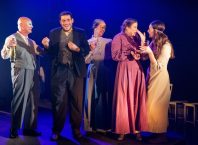Torches burn against the night sky, silent women in black and the eerily beautiful lament: “we did little good to each other.” In Paweł Szkotak’s “Macbeth: Who is that Bloodied Man?” weird sisters summon destiny in a forest of tall poles erected on the pavement. Against the backdrop of a metal fortress on wheels, men in dark trench coats and helmets zoom in on motorcycles with a crazed look in their eyes and Macbeth is literally caught on the wheel of destiny: this is war.
“I remember my first script was stamped by the censor,” recalls Szkotak, who is also Director of Theatre Polski, in an interview conducted after Biuro Podróży Theatre introduced their interpretation of Shakespeare and artistic vision to Israeli audiences in the plaza of the Cameri Theatre. Established 20 years ago, the theater specializes in outdoor performances, with all cast members involved in every aspect of the production, from building sets to driving the van. The play (performed in English) consists of very little text, Shakespeare augmented with a fragment of T. S. Eliot’s “Ash Wednesday”. Text, image and an evocative score composed by Kryzysztof “Wiki” Nowikow (sung by mezzo-soprano Magdalena Wilczyńska Goś) create a distinctive theatrical presence.
“Political roots were very important from the beginning,” says Szkotak, explaining that because at the outset they had to contend with censorship in Poland, they had to “learn how to communicate with the public not only by words, learn to avoid language.” Scripts were subject to censorship, leading the director to rely on means beyond the written text to convey his vision. His close connection to visual imagery is clear as he describes his first play, “Ein Mal Ist Keinmal” (which won first prize in a festival for young artists): “life is like a sketch for a painting which will never be painted. We never know which is the right way, and we cannot repeat. Maybe we would change something if we could.” Coming from a tradition of visually expressive theatre, trained by Growtowski actors, Szkotak says, “Thinking about acting as a whole process of body, emotion and soul is very close to me.”
The company’s history is inter-woven with the political history of Poland. Biuro Podróży did not start out as an outdoor theatre company, but the collapse of communism in 1989, while ushering in a new era of freedom and opportunity, brought about some unexpected changes that were less welcome. “Censorship was gone, most of us were very happy; we can read everything, stage anything. But theatre before was in a special position, speaking about freedom, desire…[now theatre] started to have something common, normal, nothing special. Many doors open – careers, travel – people didn’t come to the theatre. We wanted to find the people where they were on the street.”
In their first outdoor production (about Giordano Bruno, Italian philosopher and astronomer executed by the Inquisition), Szkotak “tried to imagine how the public execution could work in this time as public theatre.” As part of their aim to reach audiences who otherwise might not see theatre, they sometimes perform “without tickets…people passing by, the theatre is active and keeping their attention. The interaction depends on the country – sometimes very alive, people shout out.”
Through these interactions Szkotak has “tried to find our language for the theatre. [outdoor performance] is fantastic for the director, a great opportunity: you can use motorbikes, fire…lots of possibilities.” On working with Shakespeare, he says: “fantastic, beautiful poetry. Powerful language to translate into powerful images. Open air acting [relies on] visual power and music.” Banquo’s son, here presented as a young boy on his bicycle (in contrast to the soldiers on motorcyles), wearing shorts and suspenders, is “much more important” in Szkotak’s interpretation: “In his hands is the answer for the future, what will he make from this crown? He can be another Macbeth.”
Particularly moving is a scene between Macbeth and the boy, where the ominous and playful meet on the battlefield/playground. For a moment, they seem almost like father and son, emphasizing Macbeth’s yearning not only as a king without heirs, but as a man longing for a child. This interpretation is part of the attempt to “try to discover the mystery of a human person even in the murderer.” Enhancing the audience’s ability to understand Macbeth as a human being, enabling them perhaps to identify more closely and reflect on the implication for their own lives: “the innocence of children – as adults, what do we give them? How do we nurture them?”
Szkotak typically spends a year creating each new production, doing a lot of research, much of it visual. For Macbeth, he says, “I looked at thousands of photos and paintings. It’s inspiring…it’s my food. I looked at a lot of photos from war. Victims, soldiers, dead horses, destroyed buildings, Goya’s series of “The Disasters of War.” He is currently thinking about a new project, still too ephemeral to discuss. “Every time I try to make something optimistic, colorful…[but it ends up being] normally again, sad and cruel.” Perhaps a partial reason may be found in his comment regarding the audience’s response to Macbeth: “In each country, for the public it’s about a different war.”
Szkotak himself radiates an energy and warmth. There are moments of humor in Macbeth, and perhaps, a certain expression of hope. Szkotak says, “Macbeth has the blood on his hands, he killed himself [in this interpretation] – so maybe he understands. I think conscience builds our hope. Art especially, that is one of the possibilities to discover more about our souls. Dark, not sweet, bitter knowledge – something which builds us as a person.”
Image credit: Arale






As usual – both the text and the photos are great.
Comments are closed.